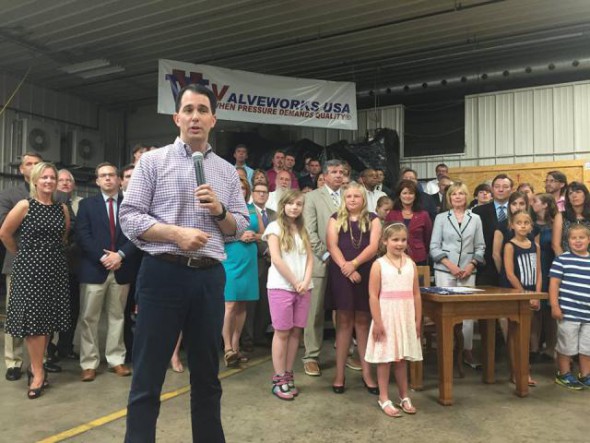Impact of Walker Skipping Debt Payment
Pushes state costs into future, shows need for better budget planning.

Governor Scott Walker signs the 2015-17 State Budget into law at Valveworks USA in Waukesha. Photo from the State of Wisconsin.
Governor Walker has delayed a payment on the state’s debt, pushing costs off into the future and increasing the amount of interest the state will have to pay. Postponing debt payments can be a helpful tool to manage budget shortfalls, but Governor Walker hasn’t released information indicating why the delay was necessary.
Instead of making a $101 debt payment that was due in May, the state skipped the payment and restructured the debt to be repaid over the next eight years. (State law allows the governor to restructure certain types of debt without getting the approval of legislators.) This move reduces spending in this fiscal year, but raises future costs in two ways:
- By increasing the amount of principal that must be repaid in future years. Spreading out the $101 million cost over the next eight years will raise payments on the debt principal by $12.6 million for each year between 2017 and 2024.
- By increasing interest costs. The state will be paying interest on the debt for a longer period of time, raising interest costs by $2.3 million over eight years.
State policymakers should be wary of pushing costs into the future, in part because the state is already facing a potential deficit in the next biennial budget. According to revenue and spending estimates released by the Legislative Fiscal Bureau in January, gross appropriations exceed projected new revenue by more than $850 million in fiscal year 2016-17. The state is counting on spending lapses of $726 million that year to help keep the budget in the black, but it is unrealistic to expect such large lapses again in the 2017-19 biennium. As a result, much of any new revenue growth in that biennium will be needed just to close a budget hole, and additional spending cuts are likely. Digging the budget hole deeper, as with this decision to delay debt repayment, could lead to additional harmful budget cuts in the next budget.
It is possible that delaying the debt payment is justified, but Governor Walker hasn’t released enough information for us to decide whether his decision was a sensible one. In the past, governors have sometimes delayed debt payments when tax revenues came in below expectations, or spending exceeded estimates. Pushing off a debt payment allowed them to avoid implementing damaging spending cuts that would be necessary to ensure that the state had a positive budget balance at the end of the fiscal year.
In the past, the tactic of delaying debt payments has generally been the result of economic downturns. Yet this is the second straight year that the Governor has found it necessary to push borrowing costs into the future – despite the fact that this is a time of national economic growth. That is not a sign of “prudent financial management.” It’s a sign that state lawmakers were too hasty to use projected revenue increases to justify more tax cuts, without preparing for the possibility that the projected increases might fall short of expectations.
Wisconsin could have avoided the higher costs associated with skipping a debt payment if it had maintained a larger, more prudent balance in its General Fund. Tax revenues and spending don’t always come in right on target, and having a budget cushion big enough to cover small fluctuations can help administrations avoid the need to skip debt payments. Right now, lawmakers are required to leave only $65 million in the General Fund when the two-year budget is passed – that’s less than ½ of 1% of annual spending from that fund. Lawmakers under both Governor Walker and Governor Doyle repeatedly postponed measures that would increase the amount of money they are required to leave in the General Fund when they pass the budget. Here’s hoping that the skipped debt payment helps lead lawmakers to the conclusion that a requiring a higher budget balance would be a step towards better management of the state’s finances.
Wisconsin Budget
-
Charting The Racial Disparities In State’s Prisons
 Nov 28th, 2021 by Tamarine Cornelius
Nov 28th, 2021 by Tamarine Cornelius
-
State’s $1 Billion Tax Cut Leaves Out 49% of Taxpayers
 Sep 21st, 2021 by Tamarine Cornelius
Sep 21st, 2021 by Tamarine Cornelius
-
TANF Program Serves a Fraction of Poor Families
 Aug 30th, 2021 by Jon Peacock
Aug 30th, 2021 by Jon Peacock





















I thought Republicans were the ones that NEVER kicked the can down the road.
Walker is such a tax and spend liberal.
SteveM
Yes, the Republicans did campaign on not kicking the can down the road. I remember hearing that over and over and over and over. Now they kick the can down the road. Hypocrites!! They just say stuff to get voted into office, and then they do what they want.